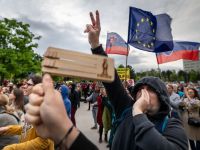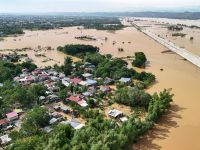Libya is expected to pay almost £3 million compensation for each of the 270 victims of the Lockerbie bomb under a deal brokered by the British and American governments, reports the Sunday Times.
Last week, Washington confirmed there has been no change in its policy towards Libya, however, acknowledged talks were held with this Arab country.
With regards to the United States and Libya being close to a deal on paving the way for Libya to get off the list of states sponsoring terrorism, State department spokesman Richard Boucher has said “There has been no change in our policy towards Libya”. “The United States and the UK have conducted a dialogue with Libya”, but added, “It doesn't represent any kind of new initiative or shift in our relationship. Libya remains on the list of state sponsors of terrorism.”
Boucher conveyed that the United States’ goal was to “change Libyan behavior”, “Libya must comply with its UN Security Council obligations, and it must put its terrorist past behind it. There can be no shortcuts around those obligations, and we continue to call upon Libya to fulfill it… the first condition is to comply with the UN Security Council requirements, but once they do that, then we would address other issues involved with their being on the terrorism list”.
White House spokesman Ari Fleischer emphasized that “Libya knows what it needs to do and that is to follow the United Nations' policies about paying reparations to the victims of the attack at Lockerbie as well as to apologize for the attack, and that has not yet taken place”.
He then made clear that any talks between Libya and the families of the Lockerbie victims was “a separate matter from de-listing Libya as a terrorist state that sponsors terrorism. That's a matter that's with the State Department and is separate…from Libya simply conforming to the actions that they are supposed to conform to in accordance with the U.N. obligations”.
U.S.-Libyan Relations
The United States supported the United Nations resolution providing Libya’s independence in 1951. Eventually, Libya opened a legation in Washington in 1954 and later on, both countries raised their missions to that of embassy level.
After Muammar Qadhafi's 1969 coup, U.S.-Libyan relations became increasingly tense due to what Washington considered as “Triploi’s support of international terrorism and subversion against moderate Arab and African governments.” In 1972, the United States withdrew its ambassador.
During the seventies, export controls on military equipment and civil aircraft were imposed, and U.S. embassy staff members were withdrawn from Tripoli after a mob set fire to the embassy in 1979.
The U.S. Government declared Libya a "state sponsor of terrorism" on December 29, 1979.
In May 1981, the U.S. Government closed the Libyan embassy in Washington and expelled its Libyan staff due to “conduct that contradicted accepted standards of diplomatic behavior.”
In August 1981, two Libyan jets fired on U.S. aircraft participating in a routine exercise over international waters of the Mediterranean claimed by Libya. The U.S. planes, in response, shot down the Libyan aircraft.
In December 1981, the State Department advised all U.S. citizens in Libya to leave and in March 1982, the U.S. Government prohibited imports of Libyan crude oil into the United States and expanded the controls on U.S.-origin goods intended for export to Libya. In April 1985, all Export-Import Bank financing was prohibited.
The United States adopted additional economic sanctions against Libya in January 1986 and Libyan Government assets in the United States were frozen. When evidence of Libyan complicity was found in a Berlin bombing that killed an American serviceman, the United States launched an attack against targets near Tripoli and Benghazi in April 1986. Since then, the United States has maintained its trade and travel embargoes and has sought to bring diplomatic and economic pressure to bear against Libya.
In 1991, two Libyan intelligence agents were indicted by federal prosecutors in the U.S. and Scotland for their involvement in the December 1988 bombing of Pan Am flight 103. In January 1992, the UN Security Council approved Resolution 731 demanding that Libya surrender the suspects, cooperate with the Pan Am 103 and UTA 772 investigations, pay compensation to the victims' families, and cease all support for terrorism.
Libya's refusal to comply led to the approval of UNSC Resolution 748 on March 31, 1992, imposing sanctions designed to bring about Libyan compliance. Continued Libyan defiance led to passage of UNSC Resolution 883, a limited assets freeze and an embargo on selected oil equipment in November 1993. (Albawaba.com)
© 2002 Al Bawaba (www.albawaba.com)







